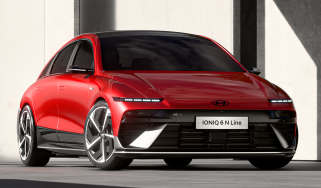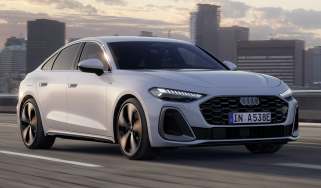Mercedes E-Class review – a smooth and refined executive saloon
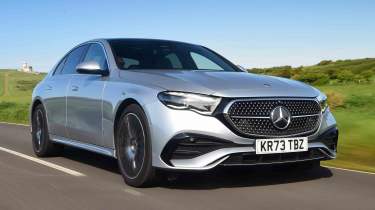

If you spend a lot of time driving on the motorway, you’ll know how important it is to have the right car for the job. A good motorway car can make those long drives fly by, keeping you comfortable, relaxed, and safe on every journey. But what should you look for when shopping for a motorway car?
First and foremost, refinement is key. A quiet cabin, supportive seats, and a smooth ride all help to reduce fatigue on extended trips. Performance also matters – whether it’s the effortless pull of a diesel engine or the instant torque of an electric motor, you’ll want enough power to overtake confidently. And let’s not forget fuel efficiency; opt for an economical car and the savings can really stack up over big mileages. It’s also important for a car to feel stable at speed – some cars' nimbleness around town might be a downside at motorway cruising speeds because they can feel skittish and unsettled.
Diesel cars have long been the choice for efficient, long-distance cruising, but some of the latest EVs have enough range to go the distance using no fuel at all. The expansion of the UK’s public charging network means that topping up on the go shouldn’t be an issue. Motorway service stations also have some of the fastest rapid chargers in the country, so you could be back on the road with a full battery in under 30 minutes.
The best motorway cars also come with advanced driver assistance features like adaptive cruise control and lane-keeping assist. These can take some of the stress out of stop-start traffic or endless stretches of motorway, with the latest systems able to overtake and change lanes automatically.
Of course, we could fill this list entirely with luxurious limos and SUVs, but we’ve instead included 10 cars across a range of price points and body styles. Their motorway finesse is better than others in their respective classes, so you’re not short of choice, no matter your budget.
Here are our picks for the best motorway cars on the market today. You might also be interested in the best hybrid cars and the best executive cars in 2025.
"The Mercedes E-Class is something of a lifeline for buyers needing a car that can travel huge distances in comfort and without having to stop often for fuel" Dean Gibson, senior test editor
While we’d argue that the latest BMW 5 Series is the best big saloon for keen drivers, the Mercedes E-Class is undoubtedly the better motorway cruiser. It’s set up with a clear focus on comfort over sportiness, which makes all the difference on long motorway drives. The air suspension system soaks up the worst of our British roads, the automatic gearbox is unobtrusive and there’s little in the way of road or wind noise. Even as you build up speed, the E-Class doesn’t lose any of its refinement or composure.
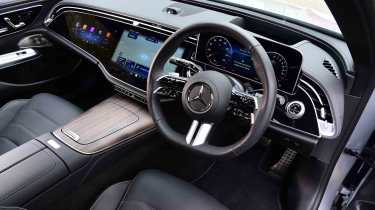
Motorway drivers will probably be most interested in the entry-level diesel E-Class, the E 220 d, which returns up to 60.1mpg thanks to a great mild hybrid 2.0-litre four-cylinder engine. Performance is decent, too, with 0-62mph completed in 7.6 seconds. The E 300 de plug-in hybrid is also worth a look because it’s one of the few PHEVs to use a diesel engine; the result is a handy official electric-only range of up to 68 miles and decent fuel economy when the battery has run out. It gets an official fuel economy figure of over 700mpg and will get up to motorway speeds quickly thanks to a 0-62mph time of under seven seconds.
| Pros | Cons |
|
|
To find the latest deals on the Mercedes E-Class, check out our sister title AutoExpress’ Find a Car service
“The Skoda Superb is not an exciting car to drive, but it is comfortable, refined and ultimately very relaxing.” Ellis Hyde, news reporter
A long-standing Carbuyer favourite, the Superb is seemingly the car that can do no wrong. It’s hugely practical, very well built and powered by a range of eager, economical engines. What’s more, it’s good to drive and one of the best-value cars in its class. It will come as no surprise, then, to learn that the Superb is a fantastic motorway cruiser, too.
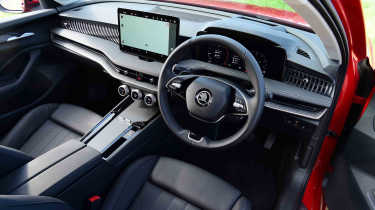
Chosen with one of its diesel engines – preferably the 148bhp 2.0-litre TDI – the large Skoda sips fuel with an official fuel economy figure of just under 58mpg, and offers sublime levels of comfort and quietness, with enough power in reserve to make overtaking a breeze. If you’re on the hunt for the ultimate do-it-all family car, the Superb is the obvious choice – especially if you have big distances to cover.
| Pros | Cons |
|
|
To find the latest deals on the Skoda Superb, check out our sister title AutoExpress’ Find a Car service
“The Mercedes S-Class is a supremely luxurious, refined and technology-laden conveyance for affluent and successful individuals” Max Adams, online reviews editor
The latest Mercedes S-Class boasts leading-edge technology and one of the most refined cabins of any car on sale, making it one of the world’s best motorway cruisers. The plug-in hybrid option can achieve up to 68 miles on a charge, so it can cruise silently through the city before heading onto the motorway. Every model gets air suspension and lots of sound deadening, so it’s always quiet and comfortable inside, and before too long it’ll be able to drive itself for periods of time (where allowed) thanks to advanced self-driving features.
Starting from just under £100,000, the S-Class is an expensive car, so it won’t be a motorway cruiser for everyone. The plug-in hybrids boast the best on-paper fuel economy, but long-distance drivers are likely to see much higher figures from one of the diesels. The entry-level S 350 d is rated for 44.9mpg, which isn’t so bad for a big saloon.
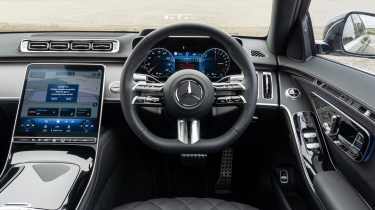
Still, we doubt many S-Class buyers will be worried about saving pennies on their fuel bill – this is a car that’s all about opulence and comfort. While the front seats are some of the best in the business, the S-Class is best enjoyed from the back on a long journey, where the experience is most civilised and luxurious. Rear-seat occupants can entertain themselves for those miles with a screen each, while the back seats can also be set up like a mobile office if you need it.
| Pros | Cons |
|
|
To find the latest deals on the Mercedes S-Class, check out our sister title AutoExpress’ Find a Car service
“The Tesla Model 3 is big enough to work as a family car and is a relaxed place in which to spend time.” Ellis Hyde, news reporter
You might think that electric cars have no place on a list of the best motorway cars but the latest ones are more than capable of sitting in the fast lane for relatively long distances. One of the most impressive is the Tesla Model 3; it’s Tesla’s cheapest model but offers up to 436 miles of range and acceleration to shame most sports cars. The minimalist interior is airy and tech-filled, so there’s plenty of gadgetry to entertain on a long motorway trip.
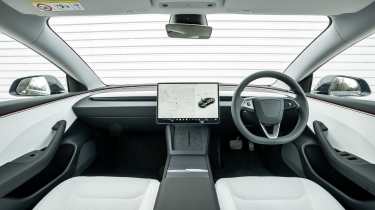
When you need to recharge, you’ll find fantastic Tesla Superchargers at most motorway service stations, which Tesla owners can use at a discounted rate. Following its major update in 2024, the Model 3 also picked up acoustically-laminated glass to help keep the cabin even quieter, which long-distance drivers will certainly appreciate. That’s all before we get onto Tesla’s cutting-edge Autopilot driver assistance system, allowing the Model 3 to take over much of the hard work on a long motorway haul.
| Pros | Cons |
|
|
To find the latest deals on the Tesla Model 3, check out our sister title AutoExpress’ Find a Car service
“if you need a hugely practical family car that’s comfortable, refined, good to drive and well-equipped, then the Octavia should be near the top of your shopping list.” Alex Ingram, chief reviewer
The Skoda Octavia proves that you don’t need to spend a fortune on a luxury car to have a pleasant motorway driving experience. Sure, it’s not the most exciting choice there is, but there are very few other cars on the market that can match it for motorway refinement at this price point.
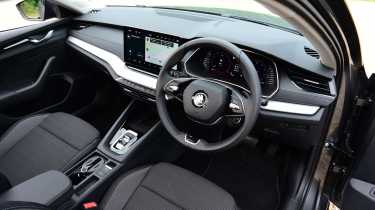
The Octavia always used to be the budget alternative to its sister car, the Volkswagen Golf, but we don’t think that holds true anymore. Nowadays, the interior quality is pretty much on par with its German twin, and the Octavia offers so much more space, too. The Octavia is one of the most economical cars for motorway driving on our list, thanks to its frugal diesel engines.
We recommend the entry-level 2.0-litre TDI engine. It may only have 114bhp, but it’s perfectly happy to sit at motorway speeds with little more than a quiet murmur from under the bonnet. Importantly, this engine will return up to 66mpg – a number that proved accurate during our testing. The base SE Technology trim is the one to go for if you prioritise comfort, as it rides on 16-inch alloy wheels with high-profile tyres that soak up bumps effortlessly.
| Pros | Cons |
|
|
To find the latest deals on the Skoda Octavia, check out our sister title AutoExpress’ Find a Car service
“The latest Audi A5 replaces the A4 saloon and Avant, as well as the various incarnations of the old A5, and is bigger and better finished inside than any of its predecessors, but it’s also much more expensive.” Paul Barker, editor
The Audi A5 arrived in 2024 to replace the old A4 saloon and we’re pleased to report that it’s just as good a motorway cruiser as its predecessor. In typical Audi fashion, its interior is the star of the show and could be enough to win over motorway drivers who will be spending hours behind the wheel. Build quality is rock-solid and it has all the gadgetry you could wish for, including adaptive cruise control and a pair of big screens as standard.
Ride comfort sits somewhere between the sporty BMW 3 Series and the comfortable Mercedes C-Class, and we think most buyers will find this a good balance. It’s cosseting enough on long journeys, but it doesn’t fall apart when you chuck it along a twisty road, either. We think the entry-level Sport model makes the most sense for motorway drivers, as its smaller 18-inch wheels help to improve ride quality.
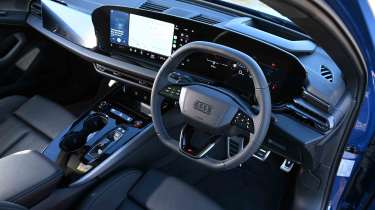
The engine range might look a bit old fashioned compared to some rivals, but the mild hybrid petrol and diesel units are still effective for motorway driving. The diesel is a bit pricier than the petrol, but it has loads of low-down torque for overtaking and will return up to 57.6mpg.
| Pros | Cons |
|
|
To find the latest deals on the Audi A5, check out our sister title AutoExpress’ Find a Car service
“The latest 3 Series retains its driver appeal, punchy performance and impressive frugality, but has added a more luxurious driving experience, more interior space and an impressive array of technology to its arsenal.” Max Adams, online reviews editor
BMW puts an emphasis on making cars that are good to drive, and the 3 Series is no exception. Whether you’re pootling along a country lane or cruising on the Autobahn, the 3 Series’s sense of refinement and surefootedness can’t be shaken. It’s firm, yet comfortable, and the petrol engines return respectable economy figures on a long run. It’s just a shame that BMW has discontinued the diesel 3 Series – die-hard diesel fans will have to look at the Audi above.
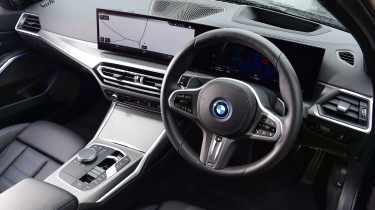
Being a BMW, you can expect the interior to have a premium quality feel about it, and the 3 Series’ cabin is particularly beautifully designed – in fact, you get the impression you’re sitting in a scaled-down 5 Series. The Infotainment system is impressive thanks to a crisp 14.9-inch central screen which blends seamlessly into the 12.3-inch digital gauge cluster. The rear seats are particularly roomy, with back-seat passengers getting more space than in rivals, so you can rest assured your occupants will be comfortable on a long motorway slog.
| Pros | Cons |
|
|
To find the latest deals on the BMW 3 Series, check out our sister title AutoExpress’ Find a Car service
“The Ioniq 6’s bold looks aren’t for everyone, but its charging speeds, comfortable interior and excellent in-car tech mean it’s up there with the best electric cars around.” Ellis Hyde, news reporter
While we think the Tesla Model 3 is the best electric saloon for motorway drivers, not everyone will get on with its minimalist interior. The Hyundai Ioniq 6 provides an alternative, offering sleek looks and a more conventional cabin. That’s not to say the Ioniq 6 lacks tech – it has all the bells and whistles you could need, including a pair of sharp screens, adaptive cruise control and even a pair of digital camera mirrors, although we’d argue these aren’t worth the £1,000 premium.
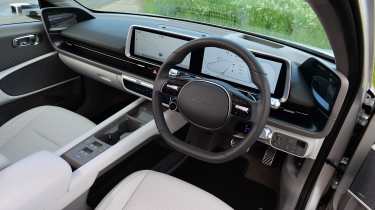
The Ioniq 6 is also spacious enough, thanks to plentiful legroom for the front and rear seats for most passengers. It’s an enjoyable car to drive on a motorway given that it’s so effortless, and yet once you do reach the B-roads closer to home, it’s rather satisfying, weaving through bends in a secure and planted manner. Range stands at 338 miles, which is some 100 miles off the cheaper Tesla, but that’s not quite the whole story. The Ioniq 6 can be recharged using a 350kW rapid-charger, meaning a 10 to 80% top up could be over in as little as 18 minutes – there are few EVs today that can match that.
| Pros | Cons |
|
|
To find the latest deals on the Hyundai Ioniq 6, check out our sister title AutoExpress’ Find a Car service
“Put simply, the Polo is the quality option in the class, and nowadays it straddles the gap between regular superminis and premium models such as the MINI.” Ellis Hyde, news reporter
We thought we’d ought to include a supermini on this list for those drivers that want a car that’s easy to park in town, but is also capable of being a good cruiser on the motorway – that’s where the Volkswagen Polo comes in. The Polo has always been the most grown up member of the traditional supermini crowd, and the latest Polo embraces this role thanks to its wider dimensions, making it incredibly stable on the motorway, and giving the feel of a much bigger car.
What’s even better is that the Polo comes with a small engine that’s great around town, but also feels refined at higher speeds. We’d avoid the entry-level 1.0-litre engine with just 79bhp, because it can feel a bit sluggish. One of the turbocharged TSI models will be better, particularly the 113bhp version with the seven-speed automatic DSG gearbox, because it's effortless to drive and will cruise along at low revs in top gear.
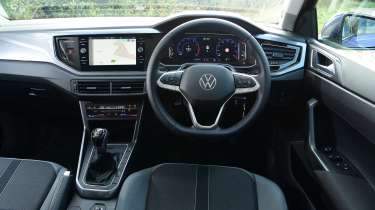
The Polo strikes a good balance between driving feel and comfort, so it's a little more playful than the model that came before it, but goes back to feeling civilised when you need it to be. In fact, the Polo's siblings, the Skoda Fabia and the SEAT Ibiza are built on the same underpinnings and are also good motorway cruisers, so they're definitely worth your consideration as well.
| Pros | Cons |
|
|
To find the latest deals on the Volkswagen Polo, check out our sister title AutoExpress’ Find a Car service
“Smarter styling, improved onboard technology, along with a raft of developments in the way the Sport drives mean that it remains as sophisticated as ever, while maintaining a dynamic edge over its bigger Range Rover sibling.” Alex Ingram, chief reviewer
Few SUVs feel more at home on the motorway than the Range Rover Sport – well, other than the full-fat Range Rover, perhaps. While that car starts at over £100,000, the Sport can be had for nearly £30,000 less, and you’ll be sacrificing hardly any motorway-cruising capabilities. It’s big, heavy and powerful, so it’s no surprise that the Sport feels solid as rock at motorway speeds.
All Range Rover Sports get clever air suspension that delivers excellent ride quality without sacrificing body control. The seats are excellent, too, with 20-way adjustability as standard so you can find your ideal position for a long journey. There’s very little wind noise on the move thanks to the masses of sound deadening, while the cabin is as opulent as we’ve come to expect from a Range Rover. Material quality is top notch and wouldn’t feel out of place in its more expensive sibling.
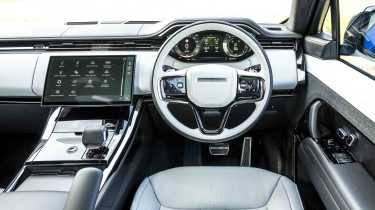
A car as big as the Range Rover Sport is never going to be particularly economical, but the new plug-in hybrid models could cut your fuel bills if you make use of the 76-mile electric range. For motorway drivers, the mild hybrid diesels make the most sense; the P250 and P300 six-cylinder diesels return nearly 40mpg.
| Pros | Cons |
|
|
To find the latest deals on the Range Rover Sport, check out our sister title AutoExpress’ Find a Car service
Below you’ll find a table of our best motorway cars. We’ve included their starting price as well as their Carbuyer score.
| Best motorway car | Make and model | Priced from | Carbuyer rating (out of 5) |
| 1 | Mercedes E-Class | £55,000 | 4.4 |
| 2 | Skoda Superb | £36,000 | 4.3 |
| 3 | Mercedes S-Class | £98,000 | 4.5 |
| 4 | Tesla Model 3 | £40,000 | 4.4 |
| 5 | Skoda Octavia | £27,000 | 4.7 |
| 6 | Audi A5 | £43,000 | 4.0 |
| 7 | BMW 3 Series | £40,000 | 4.4 |
| 8 | Hyundai Ioniq 6 | £47,000 | 4.3 |
| 9 | Volkswagen Polo | £21,000 | 4.2 |
| 10 | Range Rover Sport | £75,000 | 4.4 |
